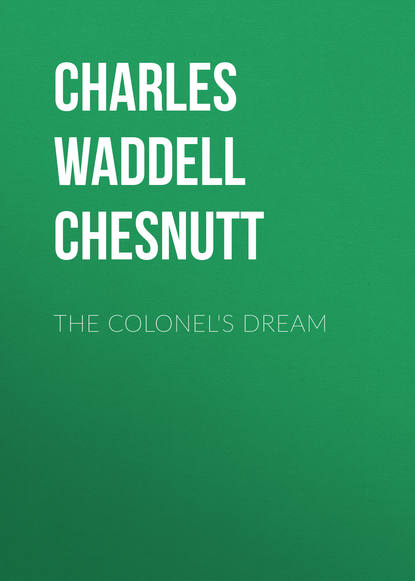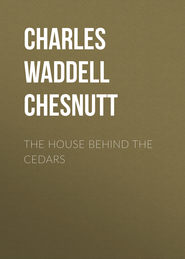По всем вопросам обращайтесь на: info@litportal.ru
(©) 2003-2024.
✖
The Colonel's Dream
Настройки чтения
Размер шрифта
Высота строк
Поля
"Ha'nts, honey, is sperrits er dead folks, dat comes back an' hangs roun' whar dey use' ter lib."
"Do all spirits come back, Uncle Peter?"
"No, chile, bress de Lawd, no. Only de bad ones, w'at has be'n so wicked dey can't rest in dey graves. Folks lack yo' gran'daddy and yo' gran'mammy—an' all de Frenches—dey don' none er dem come back, fer dey wuz all good people an' is all gone ter hebben. But I'm fergittin' de tale.
"'Well, hoo's de man—hoo's de man?' ax Mistah Sellers, w'en Jeff tol' 'im dey wuz somebody wat 'ud stay in de ole ha'nted house all night.
"'I'm de man,' sez Jeff. 'I ain't skeered er no ha'nt dat evuh walked, an' I sleeps in graveya'ds by pref'ence; fac', I jes nach'ly lacks ter talk ter ha'nts. You pay me de five dollahs, an' I'll 'gree ter stay in de ole house f'm nine er clock 'tel daybreak.'
"Dey talk' ter Jeff a w'ile, an' dey made a bahgin wid 'im; dey give 'im one dollah down, an' promus' 'im fo' mo' in de mawnin' ef he stayed 'tel den.
"So w'en he got de dollah he went uptown an' spent it, an' 'long 'bout nine er clock he tuk a lamp, an' went down ter de ole house, an' went inside an' shet de do'.
"Dey wuz a rickety ole table settin' in de middle er de flo'. He sot de lamp on de table. Den he look 'roun' de room, in all de cawners an' up de chimbly, ter see dat dey wan't nobody ner nuthin' hid in de room. Den he tried all de winders an' fastened de do', so dey couldn' nobody ner nuthin' git in. Den he fotch a' ole rickety chair f'm one cawner, and set it by de table, and sot down. He wuz settin' dere, noddin' his head, studyin' 'bout dem other fo' dollahs, an' w'at he wuz gwine buy wid 'em, w'en bimeby he kinder dozed off, an' befo' he knowed it he wuz settin' dere fast asleep."
"W'en he woke up, 'long 'bout 'leven erclock, de lamp had bu'n' down kinder low. He heared a little noise behind him an' look 'roun', an' dere settin' in de middle er de flo' wuz a big black tomcat, wid his tail quirled up over his back, lookin' up at Jeff wid bofe his two big yaller eyes.
"Jeff rub' 'is eyes, ter see ef he wuz 'wake, an w'iles he sot dere wond'rin' whar de hole wuz dat dat ole cat come in at, fus' thing he knowed, de ole cat wuz settin' right up 'side of 'im, on de table, wid his tail quirled up roun' de lamp chimbly.
"Jeff look' at de black cat, an' de black cat look' at Jeff. Den de black cat open his mouf an' showed 'is teef, an' sezee–"
"'Good evenin'!'
"'Good evenin' suh,' 'spon' Jeff, trimblin' in de knees, an' kind'er edgin' 'way fum de table.
"'Dey ain' nobody hyuh but you an' me, is dey?' sez de black cat, winkin' one eye.
"'No, suh,' sez Jeff, as he made fer de do', 'an' quick ez I kin git out er hyuh, dey ain' gwine ter be nobody hyuh but you!'"
"Is that all, Uncle Peter?" asked Phil, when the old man came to a halt with a prolonged chuckle.
"Huh?"
"Is that all?"
"No, dey's mo' er de tale, but dat's ernuff ter prove dat black cats kin do mo' dan little w'ite boys 'low dey kin."
"Did Jeff go away?"
"Did he go 'way! Why, chile, he jes' flew away! Befo' he got ter de do', howsomevuh, he 'membered he had locked it, so he didn' stop ter try ter open it, but went straight out'n a winder, quicker'n lightnin', an' kyared de sash 'long wid 'im. An' he'd be'n in sech pow'ful has'e dat he knock' de lamp over an' lack ter sot de house afire. He nevuh got de yuther fo' dollahs of co'se, 'ca'se he didn't stay in de ole ha'nted house all night, but he 'lowed he'd sho'ly 'arned de one dollah he'd had a'ready."
"Why didn't he want to talk to the black cat, Uncle Peter?"
"Why didn' he wan' ter talk ter de black cat? Whoever heared er sich a queshtun! He didn' wan' ter talk wid no black cat, 'ca'se he wuz skeered. Black cats brings 'nuff bad luck w'en dey doan' talk, let 'lone w'en dey does."
"I should like," said Phil, reflectively, "to talk to a black cat. I think it would be great fun."
"Keep away f'm 'em, chile, keep away f'm 'em. Dey is some things too deep fer little boys ter projec' wid, an' black cats is one of 'em."
They moved down the stream and were soon having better luck.
"Uncle Peter," said Phil, while they were on their way home, "there couldn't be any ha'nts at all in the graveyard where my grandfather is buried, could there? Graciella read a lot of the tombstones to me one day, and they all said that all the people were good, and were resting in peace, and had gone to heaven. Tombstones always tell the truth, don't they, Uncle Peter?"
"Happen so, honey, happen so! De French tombstones does; an' as ter de res', I ain' gwine to 'spute 'em, nohow, fer ef I did, de folks under 'em mought come back an' ha'nt me, jes' fer spite."
Seventeen
By considerable effort, and a moderate outlay, the colonel at length secured a majority of interest in the Eureka mill site and made application to the State, through Caxton, for the redemption of the title. The opposition had either ceased or had proved ineffective. There would be some little further delay, but the outcome seemed practically certain, and the colonel did not wait longer to set in motion his plans for the benefit of Clarendon.
"I'm told that Fetters says he'll get the mill anyway," said Caxton, "and make more money buying it under foreclosure than by building a new one. He's ready to lend on it now."
"Oh, damn Fetters!" exclaimed the colonel, elated with his victory. He had never been a profane man, but strong language came so easy in Clarendon that one dropped into it unconsciously. "The mill will be running on full time when Fetters has been put out of business. We've won our first fight, and I've never really seen the fellow yet."
As soon as the title was reasonably secure, the colonel began his preparations for building the cotton mill. The first step was to send for a New England architect who made a specialty of mills, to come down and look the site over, and make plans for the dam, the mill buildings and a number of model cottages for the operatives. As soon as the estimates were prepared, he looked the ground over to see how far he could draw upon local resources for material.
There was good brick clay on the outskirts of the town, where bricks had once been made; but for most of the period since the war such as were used in the town had been procured from the ruins of old buildings—it was cheaper to clean bricks than to make them. Since the construction of the railroad branch to Clarendon the few that were needed from time to time were brought in by train. Not since the building of the Opera House block had there been a kiln of brick made in the town. Inquiry brought out the fact that in case of a demand for bricks there were brickmakers thereabouts; and in accordance with his general plan to employ local labour, the colonel looked up the owner of the brickyard, and asked if he were prepared to take a large contract.
The gentleman was palpably troubled by the question.
"Well, colonel," he said, "I don't know. I'd s'posed you were goin' to impo't yo' bricks from Philadelphia."
"No, Mr. Barnes," returned the colonel, "I want to spend the money here in Clarendon. There seems to be plenty of unemployed labour."
"Yes, there does, till you want somethin' done; then there ain't so much. I s'pose I might find half a dozen niggers round here that know how to make brick; and there's several more that have moved away that I can get back if I send for them. If you r'al'y think you want yo'r brick made here, I'll try to get them out for you. They'll cost you, though, as much, if not more than, you'd have to pay for machine-made bricks from the No'th."
The colonel declared that he preferred the local product.
"Well, I'm shore I don't see why," said the brickmaker. "They'll not be as smooth or as uniform in colour."
"They'll be Clarendon brick," returned the colonel, "and I want this to be a Clarendon enterprise, from the ground up."
"Well," said Barnes resignedly, "if you must have home-made brick, I suppose I'll have to make 'em. I'll see what I can do."
Colonel French then turned the brick matter over to Caxton, who, in the course of a week, worried Barnes into a contract to supply so many thousand brick within a given time.
"I don't like that there time limit," said the brickmaker, "but I reckon I can make them brick as fast as you can get anybody roun' here to lay 'em."
When in the course of another week the colonel saw signs of activity about the old brickyard, he proceeded with the next step, which was to have the ruins of the old factory cleared away.
"Well, colonel," said Major McLean one day when the colonel dropped into the hotel, where the Major hung out a good part of the time, "I s'pose you're goin' to hire white folks to do the work over there."
"Why," replied the colonel, "I hadn't thought about the colour of the workmen. There'll be plenty, I guess, for all who apply, so long as it lasts."
"You'll have trouble if you hire niggers," said the major. "You'll find that they won't work when you want 'em to. They're not reliable, they have no sense of responsibility. As soon as they get a dollar they'll lay off to spend it, and leave yo' work at the mos' critical point."
"Well, now, major," replied the colonel, "I haven't noticed any unnatural activity among the white men of the town. The Negroes have to live, or seem to think they have, and I'll give 'em a chance to turn an honest penny. By the way, major, I need a superintendent to look after the work. It don't require an expert, but merely a good man—gentleman preferred—whom I can trust to see that my ideas are carried out. Perhaps you can recommend such a person?"
The major turned the matter over in his mind before answering. He might, of course, offer his own services. The pay would doubtless be good. But he had not done any real work for years. His wife owned their home. His daughter taught in the academy. He was drawn on jury nearly every term; was tax assessor now and then, and a judge or clerk of elections upon occasion. Nor did he think that steady employment would agree with his health, while it would certainly interfere with his pleasant visits with the drummers at the hotel.










